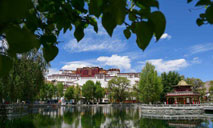Documentary on Chinese Exclusion Act "a history of America itself"
LOS ANGELES, May 4 (Xinhua) -- "This film is not a history of Chinese immigrants to America, this is a history of America itself, its very heart," the co-directors, six-time Emmy Award-winning director Ric Burns and Primetime Emmy Award-winner Li-Shin Yu, told Xinhua at an exclusive interview to discuss the themes of and motivation for their feature-length PBS documentary "The Chinese Exclusion Act."
The documentary is a powerful, gut-wrenching revelation on America's little-known historical policy of institutional racism against the Chinese, as exemplified in the U.S. government's "Chinese Exclusion Act," an infamous statute in American law that ran from 1882 to 1943 that prohibited persons of Chinese descent from immigrating to the United States - one of the lowest points in American history.
It explores the Chinese Americans and their fellow Americans who struggled against the systematic racism and violence of the time, drawing upon the power of the 14th Amendment and other U.S. laws to bring awareness and reform into the system.
The film, initially released in 2017, was screened recently at an online seminar as one of a series of events commemorating the Asian Pacific American Heritage Month, a duration of May for recognizing the contributions and influence of Asian Americans and Pacific Islander Americans to the history, culture, and achievements of the country.
For Burns, it is the American principles of law themselves that provide the means with which to eradicate racism. "Our laws are the better angels of our nature and need to be protected."
When asked what motivated them to make this film, the filmmakers revealed that in the wake of America's tumultuous and ideologically-challenged recent years, they felt that by helping to lift the veil on America's checkered past, they might help the country to avoid similar misdeeds in the future.
"We have seen firsthand the fragility of our American democratic experiment and how much is on the line," said Burns at the interview. "So it is essential that the present has a constant dialogue with history to prevent it from happening again."
"When you think of the violence and injustices against Chinese and Asian-Americans at that point of history - even though they were legal then, we knew they were wrong then and we know they are wrong now," said Yu.
The filmmakers also emphasized the extensive warp and weft of the centuries-long threads that inexorably bind the United States and China together, such as the last imperial dynasty of China stepping in to rescue the bankrupt and fledgling American republic after the Revolutionary War; Chinese laborers building by hand the monolithic 1,912-mile-long Transcontinental Railroad authorized by President Abraham Lincoln; Chinese Americans cementing into law the right of any child born on U.S. soil to be an American citizen; and many other instances.
They explained that after the Revolutionary War ended in the Treaty of Versailles, the fledging American nation was bankrupt and unable to trade with foreign powers to keep it alive due to the powerful embargo by England that prohibited its trading partners from coming to the aid of the rebel nation.
"The only country on Earth who would trade with us was China," Burns revealed. "Americans don't realize that without China there would be no America."
And the ties that bind the United States and China go even stronger than that, the filmmakers said.
"We have America because of the transcontinental railroad, and we have the railroad because of the Chinese. The transcontinental railroad was the 'moonshot' of the 19th century," Burns explained.
"America still has that economic impetus toward China. Every industry in the U.S. wants piece of China's trade," added Yu.
She lamented the recent tensions between the United States and China, but felt the two countries have a chance to improve their ties. "Relations between the U.S. and China are usually the victim of political posturing. Being considered 'friend' or 'foe' depends on the political expediency of the time," she told Xinhua.
When American politicians find themselves in a tight spot, immigration and race issues have been used as a wedge to divide people and create temporary advantages for a small, privileged group, she pointed out.
Burns concurred, adding that when a powerful racial majority like Whites in America feel that something is being taken away from them, they tend to react violently. "Scapegoats have to be found. As in the 1880s, the same thing is being played out now in the 21st century. But now it's not just the Chinese, it's Muslims and Mexicans as well."
Burns saw the only prudent course for America's leadership role in the future is an outward-reaching global view. "As the world becomes increasing global and transnational, no country has more experience with that than we do. We should be doubling down on that... It's something essential to the lifeblood of civilization and America's role in it."
Yu expected America's minorities to play a significant role in that future as they have in the past. She found it is poignant that the "marginal people" who take the brunt of American institutional racism are the very ones who have worked most tirelessly to defend America's ideals and help bring them into being.
"That's the shining human spirit that survives across the decades... I find enormous hope, inspiration and motivation in that," she said with a smile. "We must remember their legacy, continue the fight, to stand up, and be heard."
Photos
Copyright © 2021 People's Daily Online. All Rights Reserved.










